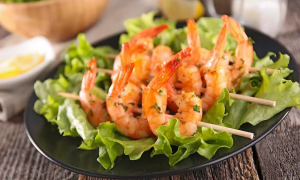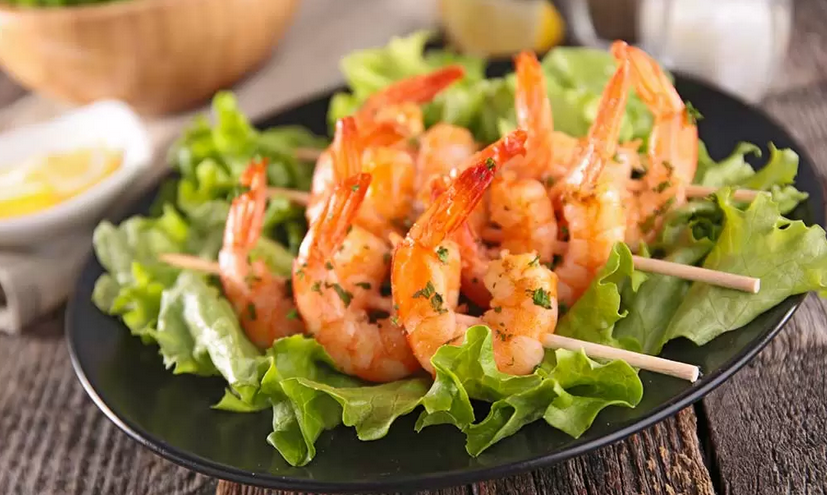Nutritional and health benefits of shrimp

Nutritional and health benefits of shrimp
There are very few people who do not like shrimp. However, this shrimp can be cooked in different ways. And its taste becomes incomparable. But we don’t know much about the nutritional value of E. As all things have two sides, shrimps have sides. Shrimps are rich in nutrients. However, although it is unique in taste and nutrition, it also does some harmful things to our body. We all have a dilemma about shrimp fish or aquatic insects. So let’s find out about that………..
Shrimp fish or insects?
Shrimps are invertebrates of the order Orthopoda. Fish are those that have a backbone and fins and breathe with gills. Shrimps have no backbone, their respiratory organs are not like true gills, and they have jointed legs that are not typical of fish. So a shrimp is not called a fish – it is called a water insect.
There are 67 species of shrimp in Bangladesh. Among them, 24 species of shrimp are freshwater and 43 species are saltwater. For example: Lumpy, Bagda, Kucho Chingri etc.
Nutritional properties and health benefits of shrimp:-
1 . Eliminates problems caused by lack of vitamin B-12 in the body:-
Shrimp is a good source of vitamins B-6 and B-12. Adequate amounts of vitamin B-12 in the body are very important. Lack of this vitamin causes various problems including anemia and even depression. Vitamin B-12 plays a very important role in increasing the amount of hemoglobin in the blood.
2 . Prawns protect the health of the heart:-
Shrimp is rich in omega-3 fatty acids. These fatty acids protect the heart from various diseases and help improve the cardiovascular system, resulting in a healthy heart.
3 . Prawns improve bone formation:-
Prawns are rich in calcium which is essential for improving the bone structure of the body. Moreover, calcium strengthens the gum structure of the teeth.
4 . Stores of various nutrients:-
Shrimp also contains nutrients such as carbohydrates, pyridoxine, vitamin-A, vitamin-E, etc.
5 . Mineral requirements of shrimp:-
Shrimp contains magnesium, potassium, phosphorus, copper, zinc, manganese, potassium, iron, sodium, which play an important role in meeting the mineral needs of the body.
6 . To fulfill the requirement of Selenium:-
Selenium is one of the most effective antioxidants for keeping body cells healthy. They contain high levels of zinc, which plays an important role in building a healthy immune system. Shrimp is a rich source of selenium.
7 . Protein fulfills the needs of:-
Shrimp is one of the best sources of protein. About 24 grams of protein is available in 100 grams of shrimp. which helps in building muscle and fulfills all the amino acid needs of the body. So you can add shrimp to your diet to meet your protein needs.
8 . Great sources of antioxidants:-
Antioxidants present in shrimp play a beneficial role for health. For example:- Antioxidant astaxanthin helps in reducing skin wrinkles and also protects from the harmful effects of sun.
9 . Helpful in weight loss:-
Shrimp is low in fat and carbohydrates, so if you want to lose weight, shrimp can be a food. However, special attention must be paid to the cooking process.
Nutrients of Prawns:-
According to USDA data, per 100 grams of cooked shrimp –
Calories – 99, Potassium – 259 mg, Cholesterol – 189 mg, Sodium – 111 mg, Magnesium – 9%, Total Fat – 0.3g, Calcium – 7%, Iron – 2%, Protein – 24g, Total Carbohydrate – 0.2 grams
According to USDA data per 100 grams of raw shrimp –
Calories – 85, Potassium – 264 mg, Cholesterol – 161 mg, Sodium – 119 mg, Magnesium – 8%, Total Fat – 0.5g, Calcium – 6%, Iron – 2%, Protein – 20g, Total Carbohydrate – 0 grams
Harmful aspects of shrimp:
1.The shell on the shrimp can be difficult to digest and block the digestive system. As a result, stomach problems and digestive problems may occur.
2 . It may be allergic in some individuals. As a result, problems like stomach problems and diarrhea may occur.
3 . Cholesterol levels are high in shrimp. Taking too much can increase the risk of heart disease. People with high blood pressure or high cholesterol should avoid shrimp.
4 . Shrimp contains some toxic substances. For example, it contains dioxins, PCBs and other banned chemicals
Caution:
Raw shrimp contains harmful bacteria and viruses. which can only be killed by high-temperature cooking. So prawns must be cooked to the right temperature. Failure to do so may result in food poisoning. As a result, gas, indigestion, diarrhea can cause various problems. It is best not to eat fresh shrimp fish in the refrigerator for more than 4 days. Can be stored up to 4 months by freezing method if needed. Even though the shrimp is an aquatic insect, it can be a tasty and delicious food to eat. So don’t push away thinking insects! And those who like it, must remember to take it in moderation. Taking too much Karan can cause various side effects in your body.

